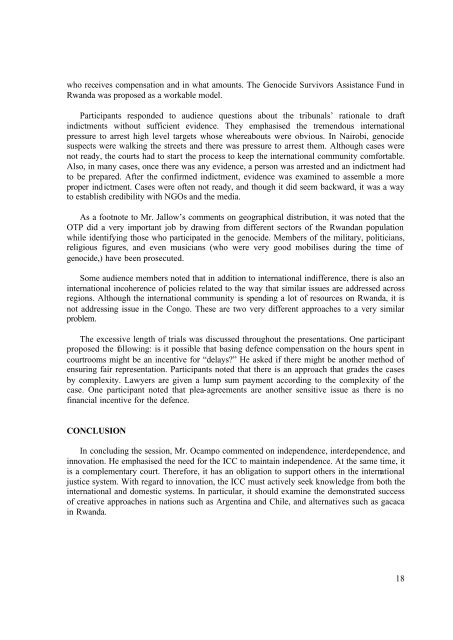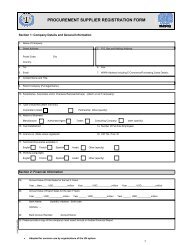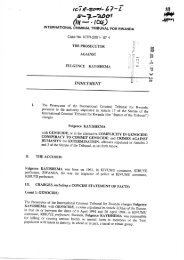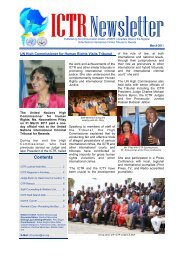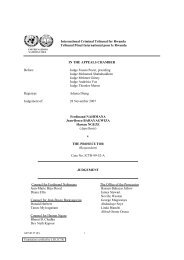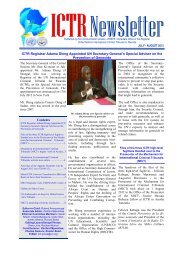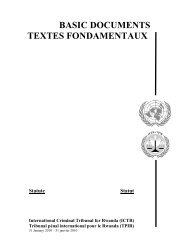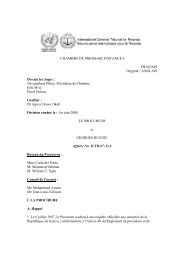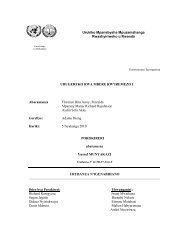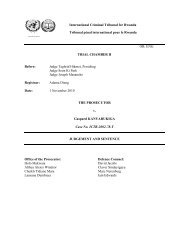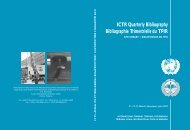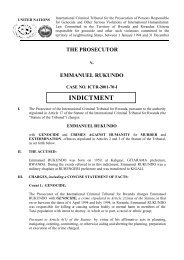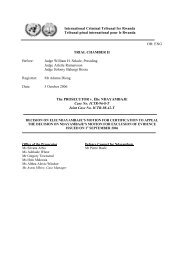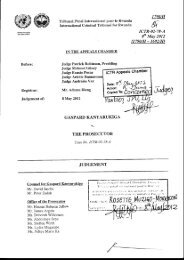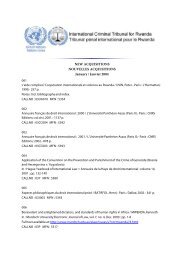Report of Proceedings - International Criminal Tribunal for Rwanda
Report of Proceedings - International Criminal Tribunal for Rwanda
Report of Proceedings - International Criminal Tribunal for Rwanda
Create successful ePaper yourself
Turn your PDF publications into a flip-book with our unique Google optimized e-Paper software.
who receives compensation and in what amounts. The Genocide Survivors Assistance Fund in<br />
<strong>Rwanda</strong> was proposed as a workable model.<br />
Participants responded to audience questions about the tribunals’ rationale to draft<br />
indictments without sufficient evidence. They emphasised the tremendous international<br />
pressure to arrest high level targets whose whereabouts were obvious. In Nairobi, genocide<br />
suspects were walking the streets and there was pressure to arrest them. Although cases were<br />
not ready, the courts had to start the process to keep the international community com<strong>for</strong>table.<br />
Also, in many cases, once there was any evidence, a person was arrested and an indictment had<br />
to be prepared. After the confirmed indictment, evidence was examined to assemble a more<br />
proper indictment. Cases were <strong>of</strong>ten not ready, and though it did seem backward, it was a way<br />
to establish credibility with NGOs and the media.<br />
As a footnote to Mr. Jallow’s comments on geographical distribution, it was noted that the<br />
OTP did a very important job by drawing from different sectors <strong>of</strong> the <strong>Rwanda</strong>n population<br />
while identifying those who participated in the genocide. Members <strong>of</strong> the military, politicians,<br />
religious figures, and even musicians (who were very good mobilises during the time <strong>of</strong><br />
genocide,) have been prosecuted.<br />
Some audience members noted that in addition to international indifference, there is also an<br />
international incoherence <strong>of</strong> policies related to the way that similar issues are addressed across<br />
regions. Although the international community is spending a lot <strong>of</strong> resources on <strong>Rwanda</strong>, it is<br />
not addressing issue in the Congo. These are two very different approaches to a very similar<br />
problem.<br />
The excessive length <strong>of</strong> trials was discussed throughout the presentations. One participant<br />
proposed the following: is it possible that basing defence compensation on the hours spent in<br />
courtrooms might be an incentive <strong>for</strong> “delays?” He asked if there might be another method <strong>of</strong><br />
ensuring fair representation. Participants noted that there is an approach that grades the cases<br />
by complexity. Lawyers are given a lump sum payment according to the complexity <strong>of</strong> the<br />
case. One participant noted that plea-agreements are another sensitive issue as there is no<br />
financial incentive <strong>for</strong> the defence.<br />
CONCLUSION<br />
In concluding the session, Mr. Ocampo commented on independence, interdependence, and<br />
innovation. He emphasised the need <strong>for</strong> the ICC to maintain independence. At the same time, it<br />
is a complementary court. There<strong>for</strong>e, it has an obligation to support others in the international<br />
justice system. With regard to innovation, the ICC must actively seek knowledge from both the<br />
international and domestic systems. In particular, it should examine the demonstrated success<br />
<strong>of</strong> creative approaches in nations such as Argentina and Chile, and alternatives such as gacaca<br />
in <strong>Rwanda</strong>.<br />
18


